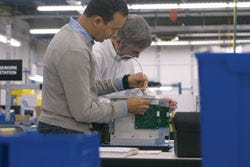Expansion and Medical Simulation Center in Store for Ximedica
High-tech mannequins mimic patients at Rhode Island Hospital's Medical Simulation Center.
August 6, 2010
Ximedica (Providence, RI) has big plans for the next year. Because the company has been rapidly expanding, it is adding more space for new cleanrooms, quality control, technical development, and prototyping. The company expects the 23,000-sq-ft expansion to be completed in early 2011.
According to Dan Reifsteck, COO of Ximedica, the company has hired 30 people in the past 12 months and is committed to bringing manufacturing jobs to New England. He says Ximedica’s holistic and human-centered design approach has made the company an indispensable partner to customers.
“Our clients are increasingly looking to us to provide the kinds of services that a lean development process demands—secure, dedicated space, fully equipped labs, and cleanrooms—and a sufficient footprint to handle whatever size manufacturing is necessary, from pilot to full-scale assembly,” Reifsteck says.
|
Ximedica cited technical development as one of the reasons for the expansion. |
Ximedica is also focusing on product usability testing and has added medical simulation to its services. The company is working with a local medical simulation center and other sites across the country as well as globally to conduct user research in realistic settings. Medical simulation creates a low-risk environment for clinicians to work with products. The technology aids engineers during the product development process and can help design teams get user feedback immediately versus waiting for hospital approval to access certain areas or deal with patient privacy issues.
The company usability projects involve interviews with surgeons, nurses, and biomedical engineers. The simulation testing process places working product prototypes in an environment with high-tech mannequins and provides quick and valuable feedback to its clients and product development teams. As product development continues to change, Reifsteck says using simulation testing is an important way to increase patient safety.
About the Author(s)
You May Also Like



.png?width=300&auto=webp&quality=80&disable=upscale)